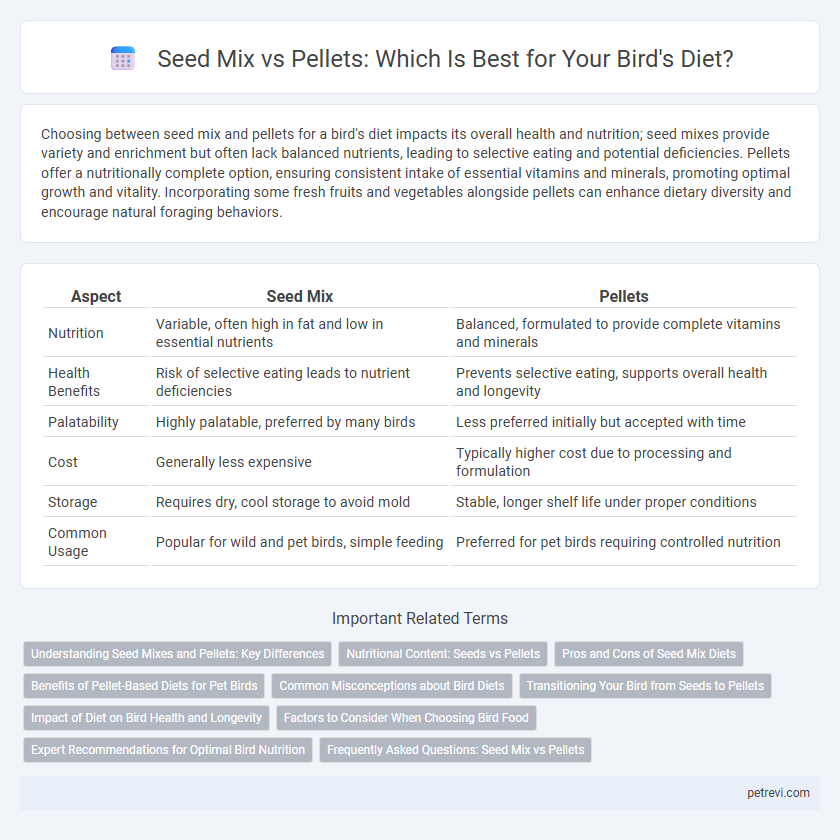Choosing between seed mix and pellets for a bird's diet impacts its overall health and nutrition; seed mixes provide variety and enrichment but often lack balanced nutrients, leading to selective eating and potential deficiencies. Pellets offer a nutritionally complete option, ensuring consistent intake of essential vitamins and minerals, promoting optimal growth and vitality. Incorporating some fresh fruits and vegetables alongside pellets can enhance dietary diversity and encourage natural foraging behaviors.
Table of Comparison
| Aspect | Seed Mix | Pellets |
|---|---|---|
| Nutrition | Variable, often high in fat and low in essential nutrients | Balanced, formulated to provide complete vitamins and minerals |
| Health Benefits | Risk of selective eating leads to nutrient deficiencies | Prevents selective eating, supports overall health and longevity |
| Palatability | Highly palatable, preferred by many birds | Less preferred initially but accepted with time |
| Cost | Generally less expensive | Typically higher cost due to processing and formulation |
| Storage | Requires dry, cool storage to avoid mold | Stable, longer shelf life under proper conditions |
| Common Usage | Popular for wild and pet birds, simple feeding | Preferred for pet birds requiring controlled nutrition |
Understanding Seed Mixes and Pellets: Key Differences
Seed mixes offer a natural variety of grains, nuts, and dried fruits that mimic a bird's diverse diet, providing essential nutrients and stimulation through foraging. Pellets are formulated to offer balanced nutrition in each bite, reducing the risk of selective eating and nutrient deficiencies common in seed-exclusive diets. Understanding these differences helps bird owners optimize diet plans for improved health, longevity, and energy levels in pet birds.
Nutritional Content: Seeds vs Pellets
Seed mixes offer a variety of natural nutrients, including healthy fats, protein, and fiber, but their nutritional content can be inconsistent and often lacks essential vitamins and minerals. Pellets are scientifically formulated to provide balanced nutrition with precise amounts of proteins, fats, vitamins, and minerals, reducing the risk of deficiencies common in a seed-only diet. Choosing pellets ensures a complete and stable nutrient profile that supports overall bird health and longevity.
Pros and Cons of Seed Mix Diets
Seed mix diets for birds offer variety and appeal, providing different textures and flavors that can stimulate a bird's natural foraging behavior and mental engagement. However, seed mixes often lack balanced nutrition, being high in fat and low in essential vitamins and minerals, which can lead to obesity and nutrient deficiencies. Regular supplementation or pairing with other food types is necessary to ensure a well-rounded diet for optimal bird health.
Benefits of Pellet-Based Diets for Pet Birds
Pellet-based diets provide balanced nutrition by combining essential vitamins, minerals, and proteins in each bite, reducing the risk of selective feeding common with seed mixes. These diets support overall health, improve digestion, and promote a stable weight, contributing to longer lifespans for pet birds. Consistent nutrient intake from pellets enhances feather quality, boosts immune function, and helps prevent obesity-related diseases.
Common Misconceptions about Bird Diets
Many bird owners mistakenly believe that seed mixes alone provide a complete diet, but these often lack essential vitamins and minerals necessary for optimal bird health. Pellet diets offer a nutritionally balanced alternative designed to meet specific dietary needs, reducing the risk of selective eating and nutrient deficiencies. Understanding the limitations of seed-only diets is crucial to prevent malnutrition and ensure vibrant, long-lasting well-being in pet birds.
Transitioning Your Bird from Seeds to Pellets
Gradually introducing pellets into your bird's diet ensures a smooth transition from seeds, promoting balanced nutrition and reducing selective eating habits. Start by mixing a small portion of pellets with seeds and slowly increase the pellet ratio over several weeks to help your bird adapt to the new texture and taste. Consistent feeding routines and positive reinforcement during this process enhance acceptance and support overall health benefits linked to pellet consumption.
Impact of Diet on Bird Health and Longevity
A balanced seed mix provides birds with a variety of nutrients but often lacks essential vitamins and minerals, potentially leading to malnutrition and shorter lifespan. Pellets are formulated to deliver a complete, consistent diet that supports optimal health, enhances immune function, and promotes longevity in pet birds. Studies show birds consuming a pellet-based diet experience fewer health issues and greater vitality compared to those fed primarily seeds.
Factors to Consider When Choosing Bird Food
Selecting the right bird food requires evaluating nutritional content, species-specific dietary needs, and ease of consumption. Seed mixes offer variety and natural foraging stimulation but may lack essential vitamins, whereas pellets provide balanced nutrition and reduced selective eating. Consider factors such as bird species, age, health conditions, and feeding habits to optimize diet and promote overall well-being.
Expert Recommendations for Optimal Bird Nutrition
Experts recommend pellets over seed mixes for optimal bird nutrition due to their balanced formulation that provides essential vitamins, minerals, and amino acids. Seed mixes often lead to selective feeding, causing nutritional deficiencies and obesity risks in many bird species. Veterinary and avian nutritionists emphasize transitioning birds to high-quality pellets to ensure a complete and consistent diet supporting long-term health.
Frequently Asked Questions: Seed Mix vs Pellets
Seed mix diets for birds provide variety and mimic natural foraging but can lead to selective eating and nutritional imbalance. Pellets offer a nutritionally balanced, consistent diet that reduces the risk of deficiencies and supports overall health. Choosing between seed mix and pellets depends on the bird species, dietary needs, and owner preferences for optimal nutrition.
Seed mix vs Pellets for Bird diet Infographic

 petrevi.com
petrevi.com